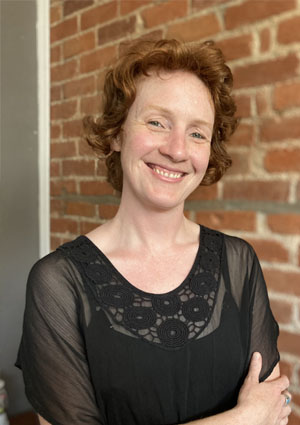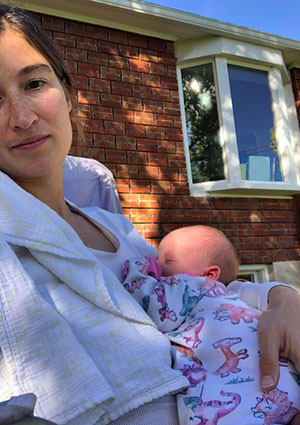Bale Editorial Team
Do you have a question about the project, the site, or participating? Please contact us at bale.biblio@gmail.com.
To reach as many participants, voices, and resources as possible, Bale is a distributed collaborative project. Our editorial team commits to long-term care and healthy growth of the site, so we would like to introduce ourselves here.
Editorial Team
Our current editors are the group who envisioned and designed the site. We met in a pod program during the pandemic. The Coalition of Feminist Scholars in the History of Rhetoric and Composition designed the pod program to create space for scholars and teachers with shared interests. We reached out to the folks at the WAC Clearinghouse, to see if they would be interested in building off the structure of CompPile but for a new project in storytelling and narrative resources. We are excited to see this project become a reality.
 April Conway: After growing up in Tucson, I eventually landed in the Midwest where I earned a PhD in English with a Rhetoric and Writing specialization. I now teach graduate and undergraduate students through the Sweetland Center for Writing at the University of Michigan. By living with my family in southeastern Michigan, I occupy the ancestral land of the Three Fire Confederacy of the Ojibwe, Odawa, and Potawatomi Nations, as well as the Wyandot Nation. As a visual artist, creative writer, and curious community member, I am interested in how storytelling can inform academic research and writing and how storytelling and community literacies intersect.
April Conway: After growing up in Tucson, I eventually landed in the Midwest where I earned a PhD in English with a Rhetoric and Writing specialization. I now teach graduate and undergraduate students through the Sweetland Center for Writing at the University of Michigan. By living with my family in southeastern Michigan, I occupy the ancestral land of the Three Fire Confederacy of the Ojibwe, Odawa, and Potawatomi Nations, as well as the Wyandot Nation. As a visual artist, creative writer, and curious community member, I am interested in how storytelling can inform academic research and writing and how storytelling and community literacies intersect.
 Emily Pifer: Born and raised in Appalachia and the Midwest, I am a nonfiction writer and doctoral candidate in the cultural rhetoric and composition program at Syracuse University, where I have taught creative and academic writing. My dissertation examines how narratives about rurality circulate through popular culture texts and material spaces, and I am particularly interested in (and excited about) the ways storytelling methods and inquiries challenge and transform dominant academic discourses and knowledge-making practices. I currently live with my family in northern Utah, where I am completing my dissertation. In doing so, I occupy the ancestral, traditional, and contemporary lands of the Northwestern Band of the Shoshone Nation.
Emily Pifer: Born and raised in Appalachia and the Midwest, I am a nonfiction writer and doctoral candidate in the cultural rhetoric and composition program at Syracuse University, where I have taught creative and academic writing. My dissertation examines how narratives about rurality circulate through popular culture texts and material spaces, and I am particularly interested in (and excited about) the ways storytelling methods and inquiries challenge and transform dominant academic discourses and knowledge-making practices. I currently live with my family in northern Utah, where I am completing my dissertation. In doing so, I occupy the ancestral, traditional, and contemporary lands of the Northwestern Band of the Shoshone Nation.
 Katie Powell: I will always consider the Mississippi Gulf Coast to be my home. However, I currently serve as an Assistant Professor, Educator in Professional Writing at the University of Cincinnati. As a white southerner, I am writing to understand the ways in which we perpetuate histories that a (white) community doesn’t want remembered yet cannot forget. I have found story to be the best method in which to explore these concepts, and am particularly interested in the intersection of story as method and my teaching work in professional writing. My research revolves around this tension, most recently in a critical genealogy of the place I now call home, which is the native homeland of the Indigenous Algonquian speaking tribes, including the Delaware, Myaamia, and Shawnee.
Katie Powell: I will always consider the Mississippi Gulf Coast to be my home. However, I currently serve as an Assistant Professor, Educator in Professional Writing at the University of Cincinnati. As a white southerner, I am writing to understand the ways in which we perpetuate histories that a (white) community doesn’t want remembered yet cannot forget. I have found story to be the best method in which to explore these concepts, and am particularly interested in the intersection of story as method and my teaching work in professional writing. My research revolves around this tension, most recently in a critical genealogy of the place I now call home, which is the native homeland of the Indigenous Algonquian speaking tribes, including the Delaware, Myaamia, and Shawnee.
 Nancy Small: Originally from the borderlands of South Texas, I’ve lived in Laramie since 2016. I’m an Associate Professor of English at the University of Wyoming, which “occupies ancestral and traditional lands of the Cheyenne, Arapaho, Crow, and Shoshone Indigenous peoples along with other Native tribes who call the Great Basin and Rocky Mountain region home.” My classes revolve around rhetoric, narrative methodologies, qualitative methods, and public memory. In my research, I’ve come to center story-based methods through wanting to understand community values and seeking ways of being an ethical inquirer. I’m happy to be part of this project because it is an opportunity to meet other folx who love storywork and because I marvel at the incredible breadth and depth of publications and other resources on narrative and story-based activities.
Nancy Small: Originally from the borderlands of South Texas, I’ve lived in Laramie since 2016. I’m an Associate Professor of English at the University of Wyoming, which “occupies ancestral and traditional lands of the Cheyenne, Arapaho, Crow, and Shoshone Indigenous peoples along with other Native tribes who call the Great Basin and Rocky Mountain region home.” My classes revolve around rhetoric, narrative methodologies, qualitative methods, and public memory. In my research, I’ve come to center story-based methods through wanting to understand community values and seeking ways of being an ethical inquirer. I’m happy to be part of this project because it is an opportunity to meet other folx who love storywork and because I marvel at the incredible breadth and depth of publications and other resources on narrative and story-based activities.


